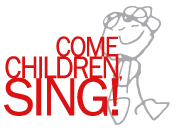The professional musician engages in line, momentum, and expression. So does the little child. The professional musician attends to rhythm, melody, and the interaction between the two. So does the little child. The professional musician practices to master musical content. So does the little child.
Little children have a remarkable gift for musicality. They thrive on musical content that challenges the musical mind at every level, and on playful activities with that musical content. Every delightful game, playparty, pretend activity and toy provides a model for playful activity. Integrating favorite modes of child play with highly musical content engages little children in “playing music,” just like professional musicians.
“Playing Music” and music babble are the young child’s way of “practicing music.” Toy microphones, telephones, or walkie talkies, modeled with music dialogue, become “musical instruments” for the young child. Pom pons, toilet paper tubes, and most any household items or toys can be used musically to serve rhythm and tonal activities. Each playful activity can be implemented with different meters, tonalities, and musical interactions, increasing the musical potential of favorite activities. And, each meter, tonality, or musical interaction can be incorporated into many different playful activities, increasing the “practice” potential with particular musical content.
The many combinations of playful activities with highly musical content keep “practice sessions” fresh and very attractive to little musicians. They also stimulate “independent practice,” as little children initiate music babble at home with the common “musical instruments.” Young children master musical content by “practicing music”—as long as the musical content is worthy of little musicians’ artistry.
“Playing music” is a joy for professional musicians and for little children. The more little musicians develop, the less they need playful activities, as the music, itself, becomes the play—just as it is for professional musicians.

